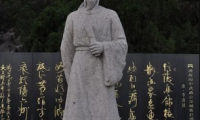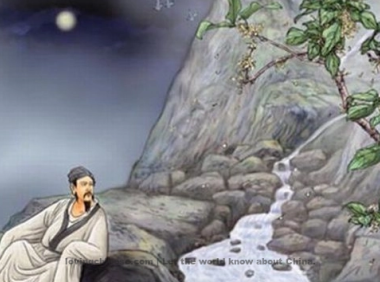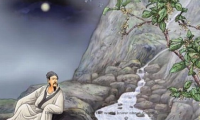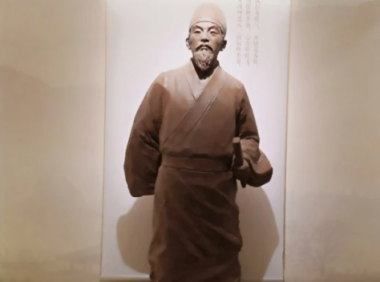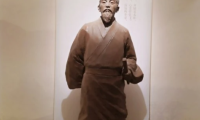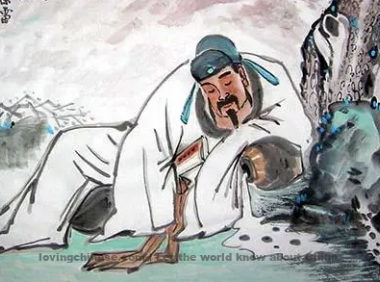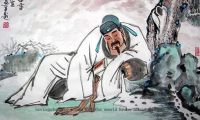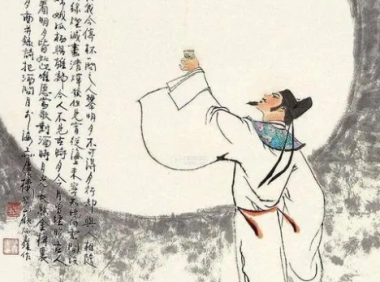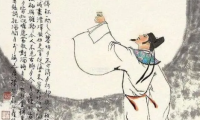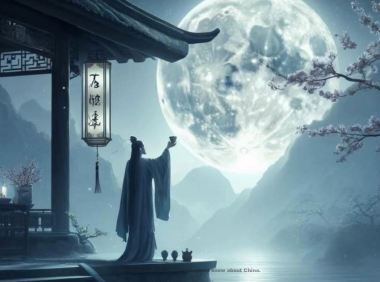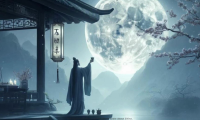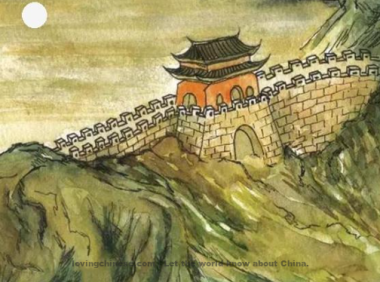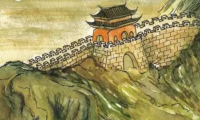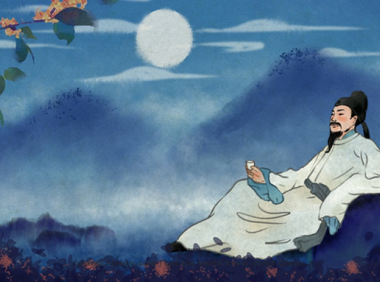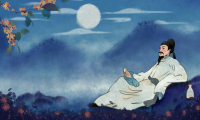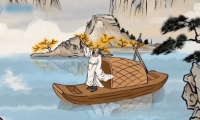-
Li Shangyin Poem: Frost and Moon – 李商隐《霜月》
"Frost and Moon" is a poem written by Li Shangyin, a poet of the Tang Dynasty....
- 0
- 0
- 95
-
Yu Liangshi Poem: The Vernal Hill in Moonlit Night – 于良史《春山夜月》
春山夜月 于良史 春山多胜事[1], 赏玩夜忘归。 掬[2]水月在手, 弄花香满衣。 兴[3]来无远近, 欲去惜芳菲[4]。 南望鸣钟处, 楼台深翠微[5]。 注释: [1] 胜事:美景。 [2] 掬:双手捧。 [3] 兴:兴致。 [4] 芳菲:指花草。 [5] 翠微:青翠的山色。 The Vernal Hill in Moonlit Night Yu Liangshi How much delight in vernal hill? Don’t go back but enjoy your fill! Drinking water, you drink moonbeams; Plucking flowers, you pluck sweet dreams. Happy, you would forget the hours; About to go, you can’t leave flowers. Looking south where you hear the bell, You’ll find green bowers in green dell. This poem describes the exquisite delight in the vernal hill where moonbeams dissolve into the handful of water the poet drinks. 《春山夜月》是唐代诗人于良史的作品。此诗描写春夜山中赏月的乐趣,诗人描绘了一幅清幽淡远的春山夜月图,流露出一种悠然自得、纵情山水的畅快心情。开篇两句交代了全篇诗情产生的由头,写出了“多胜事”是“赏玩忘归”之因。接下来的六句是对“胜事”与“赏玩忘归”的具体描述。全诗风格清淡闲雅,描摹物态历历如绘,极富神韵,尤其是颔联两句,物我交融,神完气足,意境鲜明,妙趣横生,历来脍炙人口。 Spring Mountain Moon at Night" is a work by Yu Liang Shi, a poet of the Tang Dynasty. This poem describes the pleasure of enjoying the moon in the mountains in the spring night. The poet depicts a clear and distant picture of the moon in the spring mountains at night, revealing a relaxed and happy mood of enjoying the landscape. The opening two lines explain the origin of the poem and the reason for the "many victorious events". The next six lines are the specific descriptions of the "victorious events" and the "forgetting to return from playing".…...
- 0
- 0
- 75
-
Zhang Ji Poem: Mooring by Maple Bridge at Night – 张继《枫桥夜泊》
Maple Bridge at Night" is a poem by Zhang Ji, a poet of the Tang Dynasty....
- 0
- 0
- 79
-
Zhang Ruoxu, The Moon over the River on a Spring Night – 张若虚《春江花月夜》
The Night of Flowers and Moonlight on the Spring River, praised by Mr. Wen Yiduo as "the poem in poetry, the peak on the peak" ("The Self redemption of Palace Style Poetry"), has fascinated countless readers for more than a thousand years....
- 0
- 0
- 186
-
Li Bai: Mt. Emei Moon Song
Mt. Emei Moon Song 峨 眉 山 月 歌 峨 眉 山 月 半 轮 秋影 入 平 羌 江 水 流。 夜 发 清 溪 向 三 峡思 君 不 见 下 渝 州。 E Mei Shan Yue Ge E mei shan yue ban lun qiuYing ru ping qiang jiang shui liu. Ye fa qing xi xiang san xiaSi jun bu jian xia yu zhou. Mt. Emei Moon Song Mt. Emei autumn half moonReflected on the flat Qiang River currents. Evening produces breezes at Qingxi, moving towards SanxiaThink of, but do not see you below Yuzhou. Notes: Mt. Emei: Large and sacred mountain in the province of Sichuan. Towering at 10, 167 feet, it is one of the Four Sacred Buddhist…...
- 0
- 0
- 38
-
Reflections on the Moon While Drinking – 李白《把酒问月》 – Li Bai poems in chinese and english
Li Po (李白), also Romanized as Li Bai, Li Bo, and Li Pai, was a Chinese poet of the Tang Dynasty likely born in 701. 把酒问月 青天有月来几时? 我今停杯一问之。 人攀明月不可得, 月行却与人相随。 皎如飞镜临丹阙[1], 绿烟[2]灭尽清辉发。 但见宵从海上来, 宁知晓向云间没[3]? 白兔捣药秋复春, 嫦娥孤栖与谁邻? 今人不见古时月, 今月曾经照古人。 古人今人若流水, 共看明月皆如此。 唯愿当歌对酒时, 月光长照金樽[4]里。 这是一首咏月抒怀诗。酒酣之际,诗人抬头看到亘古不变的月亮,对宇宙的冥冥发出了饱含哲理的疑问,这一对宇宙本源的求索与困惑,实际上是对自身的生命价值的思索和探寻。古往今来,人类从未停止有关月亮的遐想,多少人曾经梦想登上月亮,而月亮始终高不可攀地用万里清辉普照尘世,伴随着无尽的时光。诗人将月亮比作明镜,夜出沧海,昼隐西山,昼夜交替,历史便在这交替中演变,表达了诗人对前进不息的时光的留恋和珍惜。在对神物和仙女寂寞命运的同情中,流露出诗人自己孤苦高洁的情怀。“今人不见古时月,今月曾经照古人”是在讲“前不见古人”,而古月依旧,人生有限宇宙无穷,明月万古如一,而人类世代更替,同明月比起来,人类的有限生命真如沧海一粟。古人已流水一般逝去,今人的宿命也将如此,对着同一轮明月,古人今人关于人生和宇宙的意识得到统一。全诗意味深邃,诗人将明月与人生反复对照,在时间和空间的主观感受中,表达了对宇宙和人生哲理的深层思索。 注释: [1]丹阙:朱红色的宫殿。 [2]绿烟:遮蔽月光的浓重云雾。 [3]没(mò):隐没。 [4]金樽:精美的酒具。 Reflections on the Moon While Drinking When did the moon first come on high? I stop drinking to ask the sky. The moon’s beyond the reach of man; It follows us where’er it can. Like mirror bright o’er palace wall, When clouds disperse,it’s seen by all. At night,it rises out of the sea; At dawn,who knows where it can be? Jade Hare[1]is not companion boon For lonely Goddess of the Moon. We see the ancient moon no more, But it has shone on men of yore. Like flowing stream,they passed away; They saw the moon as we do today. I only wish when I drink wine, Moonlight dissolve in goblet mine. 注释: [1]According to Chinese legend,the Jade Hare keeps company with the lonely Goddess of the Moon. This is a poem about the moon. When the poet was drunk, he looked up and saw the moon that never changed. He raised philosophical…...
- 0
- 0
- 20
-
Drinking Alone under the Moon (1) – 李白《月下独酌(四首其一)》 – Li Bai poems in chinese and english
In 744 AD, Li Bai was dissatisfied with the life in Chang'an, where "pearls and jades are used to buy songs and laughter, and chaff is used to support talents"....
- 0
- 0
- 8
-
The Moon over the Mountain Pass – 李白《关山月》 – Li Bai poems in chinese and english
In Li Bai's poems, imagination, exaggeration, metaphors, and personification are often combined to create magical, magnificent, and moving artistic conceptions. This is why Li Bai's romantic poems are bold, unrestrained, and elegant....
- 0
- 0
- 8
-
Li Bai Poem: Drinking Alone under the Moon – 李白《月下独酌四首》
Four Poems on "Drinking Alone under the Moon" is a group of poems by Li Bai, a poet of the Tang Dynasty....
- 0
- 0
- 97
-
Li Bai Poem: The Moon over Mount Brow – 李白《峨眉山月歌》
Emei Mountain Moon Song" is a poem by Li Bai, a great poet of the Tang Dynasty....
- 0
- 0
- 90














